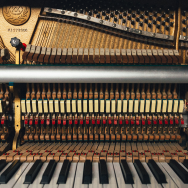If you’re a musician, this sounds too good to be true: UChicago psychologists have been able to train some adults to develop the prized musical ability of absolute pitch, and the training’s effects last for months.
Absolute pitch, commonly known as “perfect pitch,” is the ability to identify a note by hearing it. The ability is considered remarkably rare, estimated to be less than one in 10,000 individuals. It has always been a very desired ability among musicians, especially since several famous composers, including Mozart, reportedly had it. The assumption has been that this special talent has a critical period to be established in childhood based on early musical training and that it was not possible for adults to acquire this skill.
In this new study published by the journal Cognition, Howard Nusbaum, professor of psychology, and colleagues tested how much an individual’s general auditory working memory capacity can predict the success of acquiring absolute pitch. Other UChicago authors on the paper are psychology doctoral student Stephen C. Van Hedger, post-doctoral scholar Shannon L.M. Heald and College undergraduate Rachelle Koch.
This study follows up from the group’s previously published study, which shows that people with absolute pitch can be “retuned” in about 45 minutes of listening, demonstrating that absolute pitch is not so absolute. The new study shows that people without absolute pitch have the ability to learn notes quickly as well. A 2013 study from Harvard University researchers reported that a drug commonly used to treat epilepsy could effectively reopen a critical period of learning ability, allowing a person to learn skills like absolute pitch. The current UChicago study does not use medications to train the brain to learn absolute pitch skills to a comparable degree.
“This is the first significant demonstration that the ability to identify notes by hearing them may well be something that individuals can be trained to do,” said Nusbaum. “It’s an ability that is teachable, and it appears to depend on a general cognitive ability of holding sounds in one’s mind.”
The study was conducted in two experiments. Seventeen UChicago students participated in the first experiment. None had absolute pitch, and all had variable amounts of music experience. The student participants listened to notes sampled from real musical instruments through studio headphones. They heard a brief note, which was then masked by white noise. The participants were then asked to try to recreate the originally heard target note. Another part of the experiment involved testing participants after they heard an isolated piano note, and then they were asked to identify it by its musical note name (e.g., C or F-sharp).
For the training portion of the experiment, participants listened to and classified 180 piano notes—in three, 60-note blocks—and then received immediate feedback on whether they had selected the correct label for the note. They then heard the note again. Participants showed significant improvements in note identification after the training.
The researchers were able to retest some of the study participants a few months after the training session. They found that although the participants’ learning had decreased slightly, the individuals retained most of their ability to identify notes with absolute pitch.
In the second experiment, 30 UChicago students, staff and community members participated. The experiment was similar to the first one in attempting to identify notes heard through headphones. They were trained on 12 piano notes repetitively and received both visual and auditory feedback on their responses. They were then tested to determine if the training made any difference towards acquiring absolute pitch.
Although training adults to learn absolute pitch has been met with much skepticism, there is now evidence that it can be done. “We demonstrate three important findings in this paper,” said Nusbaum. “First, in contrast to previous studies, we are able to establish significant absolute pitch training in adults without drugs. Second, we show that this ability is predicted by auditory working memory. Third, we show that this training lasts for months.”
The findings suggest that adults can acquire absolute pitch even without that early exposure to pitches and musical labels. However, the current set of studies cannot directly address whether this adult-acquired absolute pitch ability is comparable to the performance of “true” perfect pitch.
